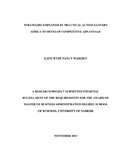| dc.description.abstract | Competition is a phenomenon that is faced by all organizations operating in both for profit and not for profit sector. To counter this competition, organizations craft strategies that will propel them to position of advantage over the rivals in the sector. The concept of competitive advantage is adopted by organizations to achieve an edge over competitors. A firm should adopt competitive strategies to secure competitive advantage. The objective of this study was to establish strategies employed by Practical Action Eastern Africa, a development based INGO to develop competitive advantage that enables it to counter competition within the NGO sector. The research design was a case study and qualitative data was collected from the regional management team, middle level management and general staff of PAEA. Respondents who participated in the study were drawn from the various departments of the organization. Primary data was collected through face to face and through telephone interviews. Secondary data was collected from the organization’s strategic plan, programme documents and quarterly review reports. The collected data was analyzed using content analysis. The study findings revealed that PAEA is an INGO that uses technology to challenge poverty in the Eastern Africa region. The services offered by the organization include delivering of renewable energy services to the poor in rural and urban areas and promotion of market approaches to deliver essential services; delivery of programmes on water, sanitation and waste management services to the targeted poor communities and empowering them to lobby for involvement in delivery of services and supporting the marginalized communities to cope with harsh conditions through food, agriculture and disaster risk reduction strategies. To leverage on programme delivery, PAEA provides consultancy and knowledge brokering services. The organization competes for donor funding, staff, recognition in the sector, credibility and visibility within the international development space. The competitive strategies the organization employs include: diversification of donors and services, partnerships, differentiation, focus, innovation, improving efficiency to achieve repeat funding and enhanced monitoring and evaluation. PAEA is also moving away from direct implementation to playing the role of a facilitator to achieve impact at scale and working with a learner cost structure to demonstrate efficiency and effectiveness. However challenges such as declining financial resources, increasing number of NGOs into the sector, staff turnover, changes in the external environment such as global economic crisis affect the implementation of the competitive strategies. The study has recommended that other development INGOs should apply strategies adopted by PAEA to reap benefits accrued from strategies identified. It has been suggested that cross sectional survey should be done across the NGO sector to establish which other strategies are applied to achieve competitive advantage. Limitations of the study include inability to generalize findings across all NGOs given the diverse nature of the sector and time constraint in collecting data. | en |

